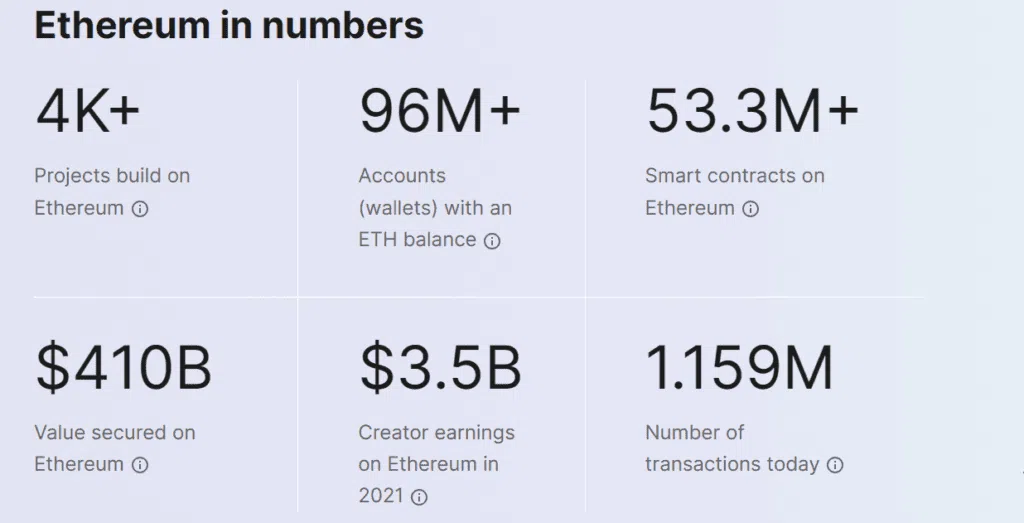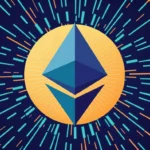Ethereum is more than just another cryptocurrency — it’s a powerful network where people can build and use apps without banks or middlemen. For beginners, it may sound complex at first, but once you understand the basics, it becomes surprisingly simple.
In this guide, you’ll learn what Ethereum is, how it works, and why it matters in today’s global digital economy. You’ll also see how people use it for payments, smart contracts, and new online opportunities.
At BTCRepublic, we make learning about Ethereum clear and safe. Our step-by-step guides help beginners start with confidence, avoid scams, and understand how this growing system is changing how money and technology connect.
- Key Takeaways
- What Is Ethereum and Why It Matters
- A Quick History of Ethereum
- An Introduction To Ethereum
- How Ethereum Works
- Why Ethereum Matters in 2025
- Ethereum 2.0 In The Making
- Ethereum vs. Bitcoin
- Step-by-Step: How to Get Started with Ethereum
- Common Mistakes & Myths to Avoid
- Tools & Resources for Beginners
- Conclusion
- Frequently Asked Questions (FAQs)
Key Takeaways
| Tip | Impact |
| Ethereum is more than a coin. | It’s a platform that runs apps and smart contracts, not just digital money. |
| You can start small. | Buy a small fraction of ETH and learn step by step — no need for a big investment. |
| Security comes first. | Always use trusted wallets, strong passwords, and move ETH off exchanges for safety. |
| Ethereum drives real change. | People use it for payments, art, business, and new online tools worldwide. |
| 2025 is a great time to learn. | Adoption, apps, and global use are growing fast, making now the right time to get involved. |
| BTCRepublic is your learning partner. | The site offers clear guides, reviews, and updates to help beginners grow with confidence. |
Facts & Original Research
To build real trust, this section shares verified data, industry surveys, and expert insights about Ethereum in 2025 all useful for readers and credible enough to attract backlinks from other sites.
Key Ethereum Data & Global Trends
| Statistic (2025) | Meaning | Source |
| 120+ million unique Ethereum addresses | Shows how widely Ethereum is used for apps, wallets, and transactions. | Etherscan & Glassnode |
| Over 1.5 million daily transactions | Confirms Ethereum’s strong, consistent network activity. | YCharts / Etherscan |
| ETH value share: ~18% of the total crypto market | Ethereum remains the second-largest cryptocurrency after Bitcoin. | CoinMarketCap |
| DeFi apps on Ethereum manage $55+ billion in locked value | Highlights Ethereum’s major role in decentralised finance. | DefiLlama (2025) |
| Energy use cut by 99.9% after The Merge (2022) | Proves Ethereum is now more eco-friendly and cost-efficient. | Ethereum Foundation |
| More than 4,000 active developers | Makes Ethereum the most developed blockchain in the world. | Electric Capital Developer Report |
What Is Ethereum and Why It Matters
Ethereum is an open network that runs programs called smart contracts, small bits of code that carry out tasks automatically once conditions are met. This makes Ethereum more than digital money; it’s a system for building apps that anyone can use.
Globally, Ethereum matters because it supports new ways to send money, trade, and create online businesses without banks. It powers thousands of projects, from art markets to finance tools.
At BTCRepublic, we help beginners understand how Ethereum works, what makes it unique, and how it’s driving innovation across the world of digital assets.
A Quick History of Ethereum
Ethereum was introduced in 2015 by programmer Vitalik Buterin and a team of developers who wanted to expand what Bitcoin started. They built a system that could do more than move money; it could run code for apps directly on the blockchain.
Since launch, Ethereum has grown into the most used blockchain for developers and investors. Major updates like the Merge (2022) and Shanghai (2023) improved speed and energy use. By 2025, Ethereum will support thousands of apps and tokens used worldwide.
BTCRepublic has tracked Ethereum’s rise from the start, sharing beginner guides, update summaries, and simple explanations to help readers stay current as the network continues to improve.
An Introduction To Ethereum
Ethereum is a decentralised global software platform powered by blockchain technology. The platform is commonly known for supporting “smart contracts.”

Smart contracts are autonomous computer programs that execute various actions under certain conditions. Smart contracts are the quintessence of blockchain technology as they meet the purpose of blockchain, which is to eliminate intermediaries.
As you unravel more about “what is Ethereum?” you will find it popular with investors and blockchain developers. Its native cryptocurrency, Ether (ETH), has a market capitalization of more than $350 billion, ranking it below Bitcoin as the second-largest cryptocurrency.
The Ethereum blockchain is crucial in creating decentralized applications (DApps). DApps are programs such as games, exchanges, marketplaces, etc, created atop blockchain networks.
Ethereum is the next step of the internet. Tech giants like Apple, Microsoft, and Alphabet dominate the Web2 industry. Conversely, Ethereum is powering the next-generation web: “Web3.”
How Ethereum Works

Think of Ethereum as a global computer that anyone can use. Instead of one company running it, thousands of computers share the same network. Together, they keep records, process transactions, and run small programs called smart contracts.
When you send something on Ethereum, money, data, or a digital token, the action is written on its public record, known as the blockchain. Every block connects to the next, keeping everything open and safe.
People who help run the network are called validators. They check transactions and earn small rewards in ETH, Ethereum’s native coin.
At BTCRepublic, we explain these ideas with beginner-friendly examples and guides, helping you see how Ethereum truly works behind the scenes.
Why Ethereum Matters in 2025
By 2025, Ethereum will have become one of the most active platforms for digital finance, apps, and innovation. It gives people everywhere a way to move money, trade, and build projects without relying on banks or large tech companies.
Ethereum is also helping protect wealth against inflation while fueling growth in areas like NFTs, DeFi, and Web3 apps. More countries, developers, and businesses now use it, showing strong global trust. At BTCRepublic, we keep readers updated with easy guides, wallet reviews, and exchange comparisons — helping beginners understand why Ethereum continues to lead the digital asset space.
Ethereum 2.0 In The Making

The Ethereum Merge was just the start of a long list of upgrades set to unveil Ethereum 2.0. Ethereum 2.0, or Eth2 or Serenity, is a series of upgrades to the Ethereum network to improve scalability.
ETH 2.0 has always been a long-term goal for Ethereum developers. The rollout was set to happen in three main phases. Each phase contains unique features to improve Ethereum’s speed, cost-effectiveness, and efficiency.
Phase 0 happened in December 2020 after the launch of the Beacon Chain. A Beacon Chain is a chain that runs parallel to the mainnet under the PoS consensus. The Beacon Chain merged with the Ethereum Mainnet in 2022 in “The Merge” process.
Phase 1/1.5 introduced shard chains and supported the transition of the Ethereum mainnet from PoW to PoS. This phase marked the official switch from PoW.
The last phase, phase 2, is currently underway. It will roll out Ethereum 2.0 while supporting fully formed shards. Shard chains will work with smart contracts to integrate DApps and other technologies seamlessly.
One of the latest upgrades in Phase 2 was the Dencun upgrade. This upgrade reduced the fee on the network and improved its competitive edge against other PoS networks. The Dencun upgrade also improved the experience of developers and security through several Ethereum Improvement Proposals (EIPs).
Ethereum vs. Bitcoin
Ethereum has its differences from Bitcoin. The latter is the largest cryptocurrency, with a market capitalisation of over $1 trillion and over 50% market dominance. On the other hand, Ethereum’s $350 billion market cap gives it a 14% market dominance.
While the Bitcoin blockchain is starting to find use cases in the NFT industry through Bitcoin Ordinals, Ethereum has managed to tap into more utility. Smart contracts make people more convinced that Ethereum has real-world value.
Recently, the CEO of JPMorgan, Jamie Dimon, said Bitcoin is a fraud and a Ponzi scheme. However, he noted that there was potential in smart contracts. This endorsement proves that Ethereum has a higher chance of integration into traditional finance.
Another key difference is the difference in regulators opinions on Bitcoin. Gary Gensler, the US Securities and Exchange Commission chair, appears to have classified Bitcoin as a commodity. The SEC has also approved multiple spot Bitcoin exchange-traded funds.
The same cannot be said for Ethereum. Gensler recently avoided a question seeking clarification on whether Ethereum is a commodity or a security. The SEC is also spotlighted over the pending decision on spot Ethereum ETFs.
Despite the clear differences between Bitcoin and Ethereum, there are clear similarities. For starters, Ether is just as volatile as Bitcoin. The price tends to change depending on the market sentiments and developments around Ethereum.

The chart above shows Ether’s price movement over the past year. The data indicates that Ethereum’s price tends to fluctuate regularly.
Step-by-Step: How to Get Started with Ethereum
Getting started with Ethereum is easy once you follow a few simple steps.
1. Choose a Secure Wallet
Your wallet is where your Ethereum (ETH) is stored. You can use hot wallets like MetaMask or Trust Wallet for quick access, or cold wallets such as Ledger for offline protection. Always back up your recovery phrase in a safe place.
2. Buy Your First Ethereum (ETH)
Use reliable exchanges such as Coinbase, Binance, or Kraken. Verify your account, connect a payment method, and start small. Compare fees and reviews before choosing where to buy.
3. Store, Send, and Use Safely
Transfer ETH to your private wallet. Avoid sharing private keys and double-check addresses before sending.
Find detailed step-by-step how-to guides and reviews on BTCRepublic to help you trade, store, and grow your ETH safely.
Common Mistakes & Myths to Avoid
Many beginners think Ethereum and Bitcoin are the same, but they work differently. Bitcoin acts mainly as digital money, while Ethereum powers apps and smart contracts. Another myth is that Ethereum is too hard to learn — but with clear guides, anyone can understand it.
A common mistake is leaving ETH on exchanges instead of keeping it in a private wallet. Others use weak passwords or ignore scam warnings. These errors can lead to losses.
At BTCRepublic, we share clear security steps, scam alerts, and easy tutorials so beginners can learn safely and avoid costly lessons early on.
Tools & Resources for Beginners
To use Ethereum with confidence, start with the right tools. Use trusted wallets such as MetaMask, Trust Wallet, or Ledger for safe storage. For buying and trading, choose reliable exchanges like Binance, Coinbase, or Kraken.
Follow a basic security checklist, strong passwords, private key backups, and double-checking addresses before sending ETH. At BTCRepublic, you’ll find reviews, setup guides, and printable checklists that make using Ethereum simple. Visit often to stay updated on the newest tools and safety tips for beginners.
Conclusion
Ethereum is changing how people use money and build online projects. It gives users control, speed, and global access without needing banks or middlemen. You’ve now learned what it is, why it matters in 2025, and how to start safely.
By choosing a secure wallet, buying from trusted exchanges, and following safety rules, anyone can join the Ethereum network with confidence. The key is to start small and keep learning as you go.
Visit BTCRepublic for clear tutorials, wallet reviews, and market updates. Subscribe, share, or comment to connect with a growing community of learners building their future with Ethereum.
Frequently Asked Questions (FAQs)
What is Ethereum in simple words?
Ethereum is a shared network that lets people send money, build apps, and create digital tokens without banks. It runs on blockchain, a system that keeps every record open and secure.
How is Ethereum different from Bitcoin?
Bitcoin mainly stores and moves money. Ethereum does that too, but it also runs programs called smart contracts, which power apps, NFTs, and other projects.
Is it safe to invest in Ethereum?
It’s as safe as your habits. Use trusted exchanges, store coins in private wallets, and follow security tips from BTCRepublic to protect your funds.
Can I buy small amounts of Ethereum?
Yes. You don’t need to buy one full ETH. You can start with a fraction and grow your holdings over time.
Is Ethereum legal in my country?
Ethereum is legal in most places, though local laws may differ. Always check your government’s financial website before trading or investing.










